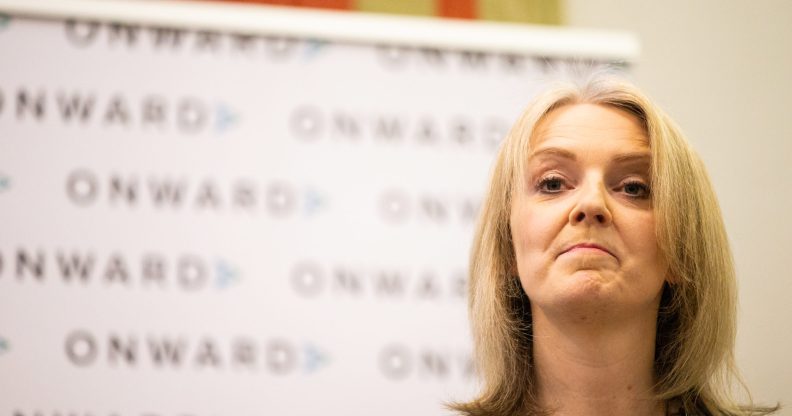Majority of Britons want conversion therapy banned, but more than one in 10 think the traumatising practice is perfectly fine

Liz Truss gives a speech at think-tank ‘Onward’ on March 19, 2019 in London. (PLuke Dray/Getty Images)
As activists lose their patience, a thumping majority of Britons want gay conversion therapy to be banned by the government, according to a poll.
The government has moved towards banning the harmful practice in fits and starts. Despite pledging to ban conversion therapy in 2018, Conservative Party leaders have only now, two years later, begun sluggish discussions on how to move forward.
Ministers have expressed unease at how to go about a national bar on a practice so tangled in religion. Queer religious leaders say there is no time to dither – “while we continue to discuss this, lives, most often young lives, are being damaged and sadly even lost,” gay evangelical Jayne Ozanne told PinkNews.
One in ten Britons don’t want conversion therapy to be banned, says startling study.
And Ozanne, who is member of the government’s LGBT+ Advisory Panel and founder of a campaign to end conversion therapy, the Ozanne Foundation, found in a survey carried out by YouGov that 62 per cent of the public want the vastly debunked method to be outlawed.
Although rather alarmingly, the study also found that around 14 per cent of those surveyed oppose the ban. With around a quarter not knowing.
The survey also found that 16 per cent of Christians agreed there should not be a ban and 15 per cent of those with any form of religious affiliation.
Moreover, the Ozanne Foundation, alongside three other religious LGBT+ organisations, have sent a letter to minister for equalities Liz Truss, whose department is spearheading the ban. Shared to PinkNews, the letter, signed by four organisation’s leaders, call on Truss to “act without delay” and finally ban conversion therapy.
All four groups – Ozanne Foundation, House of Rainbow, Post Courage and the Naz & Matt Foundation – have advised the Government Equalities Office on the issue.
“We have, between us, supported thousands of survivors after they have gone through this horrific practice, many of whom have paid a very heavy price for accepting that it does not work,” the letter stated.
“We know too many who have paid the ultimate price. The continued suicide risk remains high – indeed a recent research report1 has stated that young people are 2.5 times more likely to try multiple attempts at suicide if they have been through conversion therapy.”
All British health organisations have called on the torturous practice to be banned.
And with parliament breaking for its summer holiday next Wednesday, activists are wary that the plan to ban – which have not yet been finalised or signed off by the cabinet – might be delayed even further.
This comes as similar fears are expressed by trans activists over the proposed reforms to the Gender Recognition Act – the bedrock of British gender law –which, too, have been in the pipeline for two years but have remained untouched by ministers.
Experts have for decades called on world leaders to ban conversion therapy. So-called gay conversion therapy is often compared to torture and has been linked to higher risks of depression, suicide, and drug addiction.
All major British health organisations have denounced the practice as damaging pseudoscience, yet the cruel practice has remained untouched by government intervention. The National LGBT Government survey found two per cent of LGBT+ people have undergone conversion therapy, and a further five per cent have been offered it.
The British government pledged a ban two years ago, and on June 5 this year, following an inflamed, bi-partisan uproar, minister for equality Lizz Truss abruptly announced a ban will be announced “shortly”.
However, the celebration of the long-awaited move was brief and quickly muddled. Sources alleged that ministers are only suddenly moving ahead with the ban to “placate” the queer community after claims brewed that potentially life-saving reforms to gender legislation will be scrapped.
This was only mired further when a House of Commons committee launched a public survey on whether conversion therapy should be banned. Officials took down the questionnaire after stinging backlash.

